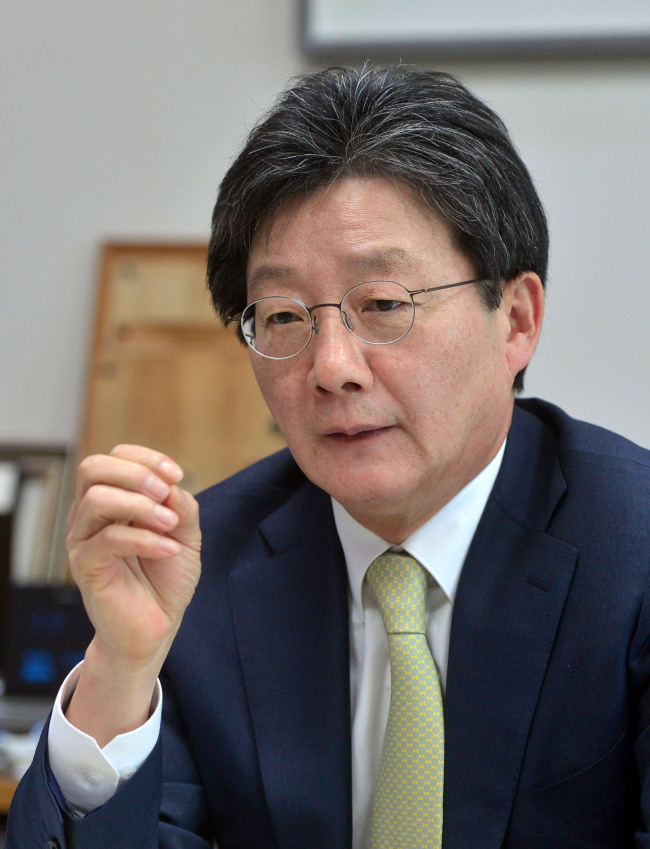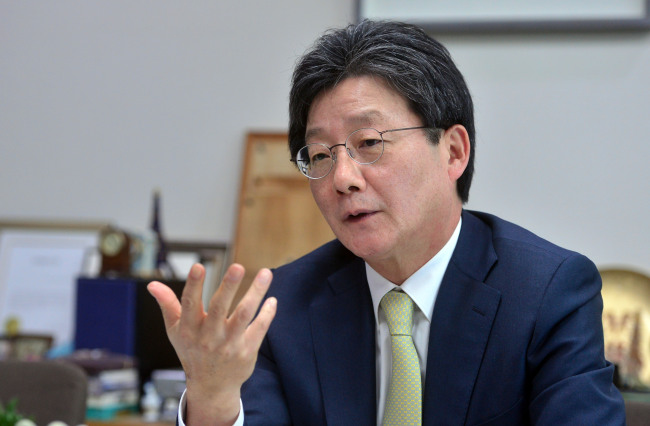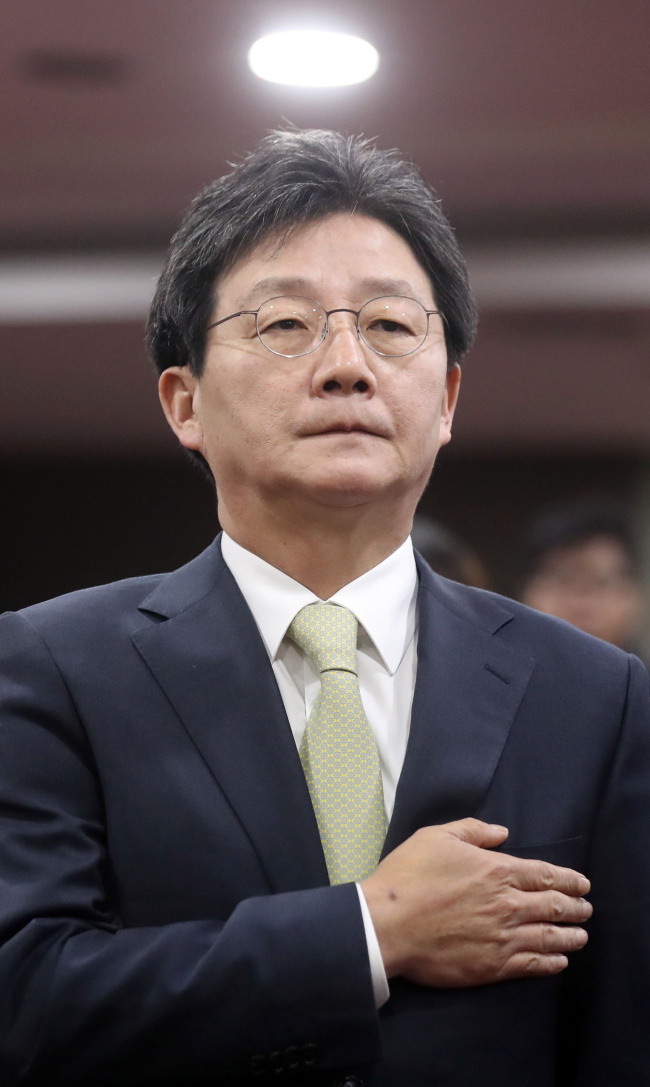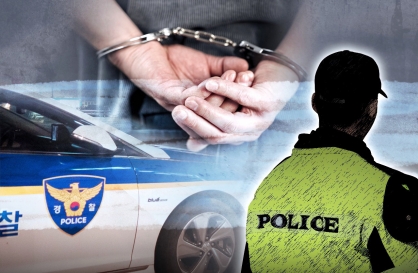[Herald Interview] ‘Early THAAD deployment will relieve uncertainty’
Conservative presidential candidate calls China’s retaliatory measures ‘imperialistic approach,’ stresses enhanced ties with US
By Yeo Jun-sukPublished : March 8, 2017 - 18:22
Despite China’s protests and economic retaliation, South Korea should press ahead with the deployment of an advanced US missile defense system to complete it before the next presidential election, according to one conservative presidential candidate.
Rep. Yoo Seong-min of the conservative opposition Bareun Party said an early introduction is the best possible way to mitigate economic setbacks the deployment would unavoidably invite from opposing neighbors. Hesitation would only allow more time and reason for them to attempt to block it, such as China’s trade retaliation against Korean companies, he added.
“Prompt deployment of THAAD (the Terminal High Altitude Area Defense system) is the way to eliminate uncertainties,” Rep. Yoo said in a recent interview with The Korea Herald at his office inside the National Assembly.
Rep. Yoo Seong-min of the conservative opposition Bareun Party said an early introduction is the best possible way to mitigate economic setbacks the deployment would unavoidably invite from opposing neighbors. Hesitation would only allow more time and reason for them to attempt to block it, such as China’s trade retaliation against Korean companies, he added.
“Prompt deployment of THAAD (the Terminal High Altitude Area Defense system) is the way to eliminate uncertainties,” Rep. Yoo said in a recent interview with The Korea Herald at his office inside the National Assembly.

The lawmaker, who from 2012 to 2014 served as chairman of the parliamentary defense committee, asserted the decision to deploy the missile defense system -- some of its components arrived on the peninsula on Monday -- is all about exercising South Korea’s sovereign right of national security against North Korea’s missile and nuclear threats. He criticized China for being “imperialistic” in protesting Korea’s defense equipment choice.
“Once we have deployed the anti-missile system, it will become a fact that other countries can’t dispute. The quicker we install it, the shorter the retaliation will last. It’s all about our sovereignty on national security. Are we going to ask China every time we purchase a weapons system? I don’t think so.”
Yoo in January declared his bid for the presidency, the election for which could take place within a couple months if President Park Geun-hye is removed from office. Park, impeached by the parliament late last year, is currently awaiting the Constitutional Court’s verdict on her fate this Friday.
In order to address China’s economic retaliation, Yoo said South Korea should seek diplomatic and legal options, including filing a complaint with the World Trade Organization, and needs to diversify its trade to reduce what he called “oversized reliance” on China. The country is South Korea’s top trade partner.
Responding to the concern that the WTO’s dispute settlement system would take too long, the politician claimed it still is a “diplomatic card” that Seoul can play against Beijing, whose leader has vowed on the international stage to uphold free trade amid rising protectionism in the US.
“Our exports and overseas investments rely on China too much. If we keep this way, China will always try to take economic retaliation against us whenever they think there is something wrong with Seoul’s diplomatic and security approaches.” Yoo said.
“Even if the WTO process is time-consuming, it doesn’t make sense for us not to pursue it. We should pursue the process as an option and, at the same time, we should take our own economic measures to prevent the Chinese retaliation from escalating into economic recession in South Korea.”
Faced with North Korea’s ever-evolving nuclear and missile threats, South Korea should come up with deterrence measures, such as bringing back US tactical nuclear weapons, which Washington withdrew from the Korean Peninsula in 1991, Yoo said.
South Korea is banned from developing nukes on its own under the Nuclear Non-proliferation Treaty -- which it signed in 1975. It is also a signatory to several other nonproliferation treaties, having declared nuclear-free in 1992.
Yoo said the government should adopt a “neither confirm nor deny” approach when it comes to the existence of nuclear weapons, stressing strategic ambiguity is needed on some issues sensitive to national security, such as the THAAD deployment.
“Under the current US extended deterrence strategy, we don’t know exactly how long it would take for US nuclear bombers to arrive here. If we have tactical nuclear weapons, we can equip them with our missiles and use them for offensive purposes. It could definitely deter North Korea,” Yoo said.
“It is hard for the government to seek consensus from the people (on every national security issues). The calls for nuclear rearmament should emerge from politicians, like me. In the meantime, the president and military chiefs should stay calm and give the people a smile. That’s what I’m talking about.”

From Yoo’s perspective, the keys to solving North Korea’s nuclear issues is enhanced bilateral ties between Seoul and Washington and a stepped-up role of China as a “responsible stakeholder.”
US President Donald Trump, despite his recent harsh rhetoric against China, could strike a surprise deal with China to convince it to squeeze North Korea with economic sanctions into abandoning nuclear ambitions. said Yoo. China is North Korea’s top ally and trade partner.
“Of course the key is whether China will accept our request. But China is such a big country and it wants to raise its profile in the international community. If the US accepts some of what China wants, it would play a bigger role in reining in the North. It is the most effective and viable strategy.”
When it comes to the renegotiation of the Korea-US free trade deal, Yoo said South Korea will have no choice but to accept the request for terms revision, should Washington officially demand it. But until then, Seoul should prevent the issue from becoming politicized domestically.
The politician said he would create a governmental agency dedicated to trading issues, criticizing the government for lacking in efforts to prevent potential economic fallouts from the looming renegotiation of the trade pact, which took effect in 2012.
“If there is a request from the US, the Korean government wouldn’t be able to avoid a renegotiation. What we should focus on is to figure out how we can make the best of a new deal and how we should offer compensation for the affected industries. But I don’t think there is a specific plan for the government.”
The politician described President Park’s approach toward North Korea as “unrealistic,” saying the president has lacked specific plans in either adopting an assertive stance against North Korea or pursuing appeasement initiatives -- such as a “trust-building process on the Korean Peninsula.”
“I don’t think her North Korea policies were based on the reality. Look what their leader Kim Jong-un has been doing so far, the so-called trust-building is a joke. I think we need to take a more assertive and realistic approach than Park and her predecessor Lee Myung-bak.”
US President Donald Trump, despite his recent harsh rhetoric against China, could strike a surprise deal with China to convince it to squeeze North Korea with economic sanctions into abandoning nuclear ambitions. said Yoo. China is North Korea’s top ally and trade partner.
“Of course the key is whether China will accept our request. But China is such a big country and it wants to raise its profile in the international community. If the US accepts some of what China wants, it would play a bigger role in reining in the North. It is the most effective and viable strategy.”
When it comes to the renegotiation of the Korea-US free trade deal, Yoo said South Korea will have no choice but to accept the request for terms revision, should Washington officially demand it. But until then, Seoul should prevent the issue from becoming politicized domestically.
The politician said he would create a governmental agency dedicated to trading issues, criticizing the government for lacking in efforts to prevent potential economic fallouts from the looming renegotiation of the trade pact, which took effect in 2012.
“If there is a request from the US, the Korean government wouldn’t be able to avoid a renegotiation. What we should focus on is to figure out how we can make the best of a new deal and how we should offer compensation for the affected industries. But I don’t think there is a specific plan for the government.”
The politician described President Park’s approach toward North Korea as “unrealistic,” saying the president has lacked specific plans in either adopting an assertive stance against North Korea or pursuing appeasement initiatives -- such as a “trust-building process on the Korean Peninsula.”
“I don’t think her North Korea policies were based on the reality. Look what their leader Kim Jong-un has been doing so far, the so-called trust-building is a joke. I think we need to take a more assertive and realistic approach than Park and her predecessor Lee Myung-bak.”

Last week, Yoo told his party members that he is “99.9 percent” confident that the Constitutional Court will remove Park from office permanently. He is among the 234 lawmakers who casted vote in favor of impeaching the president last December.
Still, all presidential candidates and political parties must respect the court’s decision, regardless of the outcome, Yoo said, warning that disobeying it would be a grave act of undermining the “core value” of the rule of law.
“We must accept the court’s decision unconditionally and our party members will do the same. Politicians should stop inciting public protests and threatening to defy the court’s decision.”
Despite his background as an economic scholar, Yoo asserted that national security is a more crucial agenda for South Korea, who is technically at war with North Korea and surrounded by global powers competing for regional dominance.
For Yoo, one of the most vocal critics of President Park’s governing style, the most important quality for a democratic leader is communication skills and self-control. The next president should reach out to the legislative body, particularly opposition parties, he said.
“If I had to choose between security and economy, I’ll definitely go for security. It is related to the survival of the nation… I think there is a lot to do for the next president. A leader should figure out what its opposition wants and make a deal if necessary,” he said.
By Yeo Jun-suk (jasonyeo@heraldcorp.com) and Jo He-rim (herim@heraldcorp.com)






![[From the Scene] Monks, Buddhists hail return of remains of Buddhas](http://res.heraldm.com/phpwas/restmb_idxmake.php?idx=644&simg=/content/image/2024/04/19/20240419050617_0.jpg&u=20240419175937)








![[From the Scene] Monks, Buddhists hail return of remains of Buddhas](http://res.heraldm.com/phpwas/restmb_idxmake.php?idx=652&simg=/content/image/2024/04/19/20240419050617_0.jpg&u=20240419175937)

![[KH Explains] Hyundai's full hybrid edge to pay off amid slow transition to pure EVs](http://res.heraldm.com/phpwas/restmb_idxmake.php?idx=652&simg=/content/image/2024/04/18/20240418050645_0.jpg&u=20240419100350)

![[Today’s K-pop] Illit drops debut single remix](http://res.heraldm.com/phpwas/restmb_idxmake.php?idx=642&simg=/content/image/2024/04/19/20240419050612_0.jpg&u=)